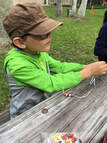|
Talking About
Florida Homeschooling... Evaluations and More |
A good evaluator works for the parents, assisting them in meeting legal requirements and in supporting them when districts overstep their bounds." |
circumnavigating the globe and using trigonometry in your daily life in that same way, but math is used on a regular basis by adults. It's a useful tool that helps people measure ingredients to bake cookies (or even to make double- or triple-size batches in one large bowl), make sure they have enough money to go on vacation, build shelves or other projects, etc. Figure out what you do (or could do) with math and do it around your child. Another way to build a child's interest is to do some projects or hands-on activities. Use building plans. Bake multiple batches of something. Help the child take on a small business and keep records of his expenses and income. Even take a word problem from a math book and act it out (and add as much drama as you can to spice it up). Find board games or card games or fun computer programs to make it seem like fun. There are trivial ways that may work better than expected. For example, do math problems with a paint brush and water on the sidewalk. Or with magnets on the refrigerator. Or with the answers written on a tic-tac-toe board. Or suddenly give a treat because of the math. Cheer like a cheerleader when the math is done right. Put stickers on papers. Proudly show the math to relatives and tell them how much he's learning. But another method of getting a child interested in learning more math is to step back and help him see why adults have been teaching math to children for so much of history. (When I worked at the Field Museum of Natural History's library, the oldest item in the rare book collection was an ancient Egyptian papyrus with math homework on it.) Help him look at different careers and how math is involved in them. Help him understand that even with fancy computer programs, he'll need to have enough understanding of math to recognize if an answer makes no sense. Help him to see that without a knowledge of math, he'll be limiting his options in the future as many positions will require a knowledge of math. And then take it another step and make sure that he is ready for the math. If he's not ready, back up and re-learn the math needed to move on to the next level. Be encouraging, reassuring him that he'll get it eventually if he keeps working at it; let him take a break for a bit if needed, but then find a fun way to reintroduce it. So, should you give up on math (or some other subject) with a child that doesn't want to learn it? No. Though you might take a break for a few weeks--particularly if he's reached a point of total frustration. Then begin again with some fun method, with work that he can easily handle, cheer a lot, try to find some projects or games to use, let him see how it will be helpful in adult life, etc. If he's capable of learning, I'm convinced he'll eventually get it, but you might need to take time to help him get interested. The time and effort that takes will pay off greatly as his learning will increase so much once he's interested.
0 Comments
Your comment will be posted after it is approved.
Leave a Reply. |
Archives
April 2024
Categories
All
|

 RSS Feed
RSS Feed







